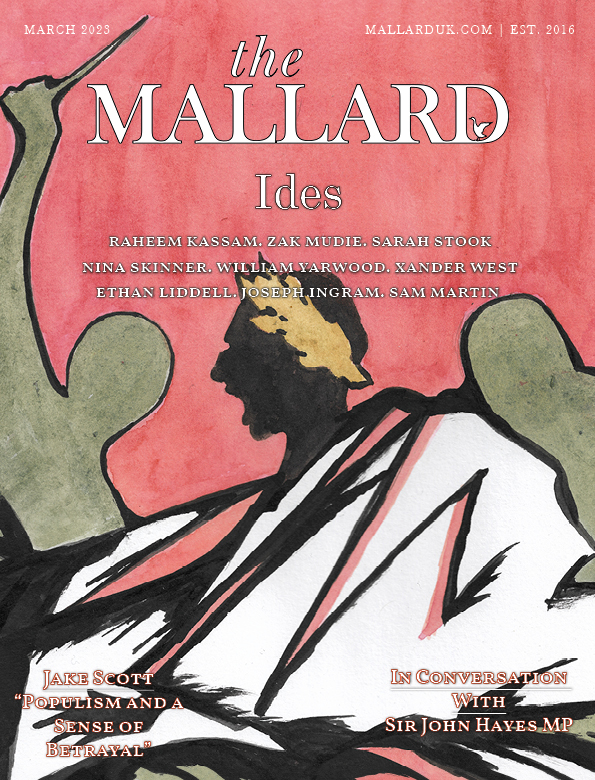Economic Bondage Against the Family (Magazine Excerpt)
In his 1936 Essay on the Restoration of Property, the author Hilaire Belloc recalls an image he had read two decades before and reproduces to the best of his memory. I’ll adapt it: imagine a single machine that produces everything society could possibly need. If this machine is owned by the collective, through a caste of bureaucrats, we have socialism. Everyone who tends the machine are regularly doled-out what they allegedly need by this bureaucratic caste. If the machine is owned not by many but by just one man, we have monopolistic capitalism, of the type resulting from complete laissez-faire. Most people work the machine and get a wage in return so they can buy its produce. Some others are employed in entertaining the owner, and all the rest are unemployed.
Belloc doesn’t say it, but we could imagine that working the machine involves just pushing a button repetitively. If technology did advance to the point that all which humans need could be provided by one machine, surely it could be worked by merely pushing one button repeatedly.
I rehearse this second-hand image because through it Belloc makes a point: these are capitalism and socialism as “ideally perfect” to themselves. If such a machine existed, this is what each system would look like.
Both monopoly capitalism and socialism share an agnosticism about the role of property and work in human life. Neither ideology views work nor property as ends in themselves but only means to further ends. For the socialist this end is consumption. Material needs are more important than freedom. To borrow again an image from Belloc, socialists view society as like a group stranded on a raft. The single overwhelming concern is not starving, so food is rationed and handed out according to a central plan. Perhaps a man finds fishing fulfilling and would lead a happy life honing the fishing craft. Maybe he would benefit from selling fish for a profit so he can support his craft. But the circumstances are extreme, so the group take collective ownership of his fishing rod and collective charge of distributing the fish. It’s for this reason that socialism is so appealing to ideologies that see existence as struggle.
For the monopolist this end is profit. Money-making is the only purpose of economic activity, separate from any human need or fulfilment from work. Property is good only if it generates money; not because it has any fixed purpose within human life. Work also is good only if it generates money, and if profits can be increased while reducing the amount of work needed, this is preferable. This is the reasoning Adam Smith uses to create the production line. The goods produced, further, also have no value apart from the profit they create.
Neither system recognises that humans are rational animals who flourish by both having and using private property as an extension of their intelligence. Thus, if a machine existed which could produce everything needed for life by repeatedly pushing a button, both systems would adopt it and consider themselves having achieved perfection. Everybody (or almost everybody) could be employed doing the same repetitive activity, differing only on the matter of whether their employer is private enterprise or the collective.
The worker pushing a button is akin to one working on a conveyor belt in a factory, or in bureaucratic pen-pushing. His livelihood consists in a single repetitive and mindless task which requires little intelligence to perform. A craftsman, on the other hand, creates something from start to finish by himself or as part of a team effort with other craftsmen. Intelligence runs all through the activity. Making a teapot, fixing a car engine, building a house, or ploughing a field, each requires applying a design with one’s hands, that has already been worked-out by one’s mind.
Another effect of this agnosticism involves the consumer. The sort of consumption monopolists think about is a limitless glut happening in a social vacuum. It is want unrelated to need, because the only way we can truly specify need is by defining a fixed purpose for human life. Human needs, on an ancient view, relate to the kind of life humans must live to be truly happy and flourishing. So, we need food, water, shelter, and other commodities. But we also need to exercise our uniquely human faculties, like creativity, aesthetic appreciation, imagination and understanding. We also need to know how much of a good or activity to have. After all, eating until we pass out isn’t good for us, and to sit around imagining all day may run into idleness.
As a result, neither system has much room for organic human community at the local level. Such communities depend on need which goes beyond the mere satisfaction of material wants. Work, for example, is more than just a way to get what we need to live. It’s a vocation, which taps into our rational human nature, and gives us joy through creating and shaping our surroundings.

This is an excerpt from “Nuclear”.
To continue reading, visit The Mallard’s Shopify.



















